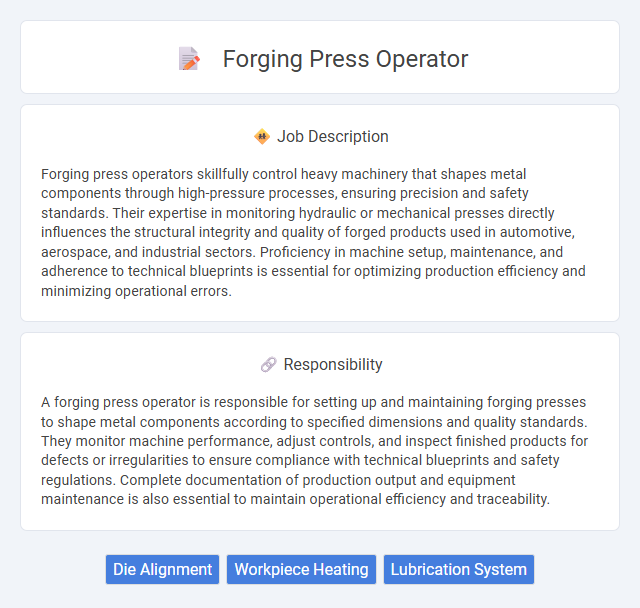
Forging press operators skillfully control heavy machinery that shapes metal components through high-pressure processes, ensuring precision and safety standards. Their expertise in monitoring hydraulic or mechanical presses directly influences the structural integrity and quality of forged products used in automotive, aerospace, and industrial sectors. Proficiency in machine setup, maintenance, and adherence to technical blueprints is essential for optimizing production efficiency and minimizing operational errors.
Individuals with strong physical stamina and good hand-eye coordination are more likely to thrive as forging press operators. Those who can maintain focus in a noisy, fast-paced environment and follow strict safety protocols are probably the best fit for this role. Candidates with prior experience or training in heavy machinery operation may have a higher probability of success in this job.
Qualification
A forging press operator must possess a high school diploma or equivalent, with technical training in metalworking or machining preferred. Proficiency in reading blueprints, understanding forging specifications, and operating heavy machinery safely is essential. Experience in industrial manufacturing environments and knowledge of safety protocols are critical qualifications for optimal performance.
Responsibility
A forging press operator is responsible for setting up and maintaining forging presses to shape metal components according to specified dimensions and quality standards. They monitor machine performance, adjust controls, and inspect finished products for defects or irregularities to ensure compliance with technical blueprints and safety regulations. Complete documentation of production output and equipment maintenance is also essential to maintain operational efficiency and traceability.
Benefit
Forging press operators likely experience improved skill development and job stability due to the specialized nature of their work. The role probably offers competitive wages along with benefits such as health insurance and retirement plans. Opportunities for career advancement within manufacturing or metalworking industries may further enhance long-term employment prospects.
Challenge
The role of a forging press operator often presents challenges related to maintaining precision and safety during high-pressure metal shaping processes. Operators may encounter variability in material properties that require quick adjustments to press settings, demanding strong problem-solving skills. There is a probable need for constant vigilance to prevent equipment malfunctions and ensure consistent product quality.
Career Advancement
Forging press operators develop specialized skills in operating heavy machinery to shape metal components, which can lead to career advancement as technicians, supervisors, or quality control inspectors in manufacturing plants. Gaining certifications in machine operation and safety enhances job prospects and opens pathways to maintenance and engineering roles. Experience in this field also provides opportunities for leadership positions due to the critical nature of precision and safety in forging processes.
Key Terms
Die Alignment
A Forging Press Operator ensures precise die alignment to maintain product quality and prevent defects during the forging process. Proper die alignment reduces material waste and equipment wear, ensuring consistent production efficiency. Mastery in adjusting and securing dies is critical for meeting tight manufacturing tolerances in high-volume forging operations.
Workpiece Heating
Forging press operators are responsible for heating workpieces to precise temperatures, often between 1,200degF and 2,300degF, to ensure optimal malleability and structural integrity during the forging process. They monitor furnace controls and use thermal measurement tools to maintain consistent heat, preventing defects such as cracks or incomplete shaping. Proper heating techniques directly influence the quality and durability of forged components in automotive, aerospace, and industrial applications.
Lubrication System
A forging press operator is responsible for maintaining the lubrication system to ensure smooth and efficient operation of the press machinery. Proper lubrication minimizes friction and wear on critical components such as bearings and dies, extending equipment lifespan and preventing costly downtime. Regular inspection and adjustment of oil flow rates and lubricant levels are essential to maintain optimal press performance and safety.
 kuljobs.com
kuljobs.com